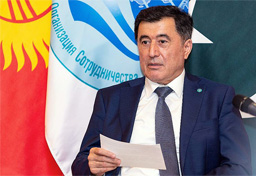BEIJING (TASS) — Member-states of the Shanghai Cooperation Organization (SCO) are working on a gradual transition to mutual settlements in national currencies as part of their financial cooperation development.

- Vladimir Norov
- SCO Secretary General
(© Artyom Ivanov / TASS)
SCO Secretary-General Vladimir Norov told TASS in an interview; said:
The countries have a common understanding that the consideration of a gradual transition to mutual settlements in national currencies can be an optimal vector for further developing financial cooperation within the SCO framework.
This work has already begun. Representatives of the SCO Interbank Consortium are engaged in it. A new document has been outlined and mutually acceptable approaches for its implementation in the near term and the long term are being determined.
This mechanism “can become not only an efficient tool to jointly overcome the pandemic’s consequences, but it will also make it possible to optimize the financial resources of SCO member-states, strengthen internal financial cooperation among member-countries of the organization and fortify investment activity”, he said. “This can be the basis aimed at securing transparent, predictable and stable conditions for the development of economic ties, growth in mutual trade and investment cooperation broadening the interests of the peoples of SCO countries”, the secretary-general explained.
“There is also a need to establish partner ties with international financial institutions, such as the Asian Infrastructure Investment Bank, the BRICS New Development Bank and the Silk Road Fund in order to fully unlock the organization’s investment potential, so that their capabilities are used to carry out joint cross-border projects within the SCO”, he added.


Juliano di M. (16 April 2021, 21:08)
It’s very subtle on the part of the Chinese, because they’ re not going to use rupees or tenges, or even rubles, but yuans. But it won’t work, at some point the Russians will be forced to break the system to avoid falling under China’s grip.
Richard from Dubai (16 April 2021, 23:37)
Iran tried to switch to the euro, but it didn’t work. It tried to use yuan and even rupees (the currencies of its oil clients), without more success. In the past, the Soviet Union imposed the ruble on its satelites, we know the story. Bitcoin is not a currency. So the dollar will be the main trading currency for a long time.
Juliano di M. (17 April 2021, 00:25)
The most important and essential function of a medium of exchange is to be widely acceptable and have relatively stable purchasing power: determination of price is an essential condition for justice in exchange. In the context of the SCO, only the yuan can offer this sort of guarantee. After all, the Chinese invented the FIAT currency, since they introduced banknotes in the 11th century.
Joe P (17 April 2021, 00:36)
The Chinese economy is a sham. Not only do they inflate their statistics (at least by 30% on the GDP), they also pursue a policy of speculation. Anyone who knows the Chinese knows that they are very much casino players. They have this casino mentality. And they’re going to lose their shirts.
This is to say that even before the yuan could become an alternative currency to the US dollar, China would be bankrupt.
Epic Dustin (17 April 2021, 01:29)
Joe P: "they also pursue a policy of speculation ... China would be bankrupt"
This is the case for the USA, the EU, Japan, the UK... Even the Swiss will be bankrupt. In the end, it’ s Afghanistan that will come out of it since they can’t go any worse.
Richard from Dubai (17 April 2021, 08:20)
To try to supplant the dollar is naive. Not even the pound can do that despite the immense Commonwealth. For SCO, take Kazakhstan for example. They want to modernise in leaps and bounds and need to import from Europe, Japan, Korea and even the US. So they will need a lot of dollars. Therefore, they will demand dollars from itheir clients for oil, uranium, steel, etc. To get out of the dollar, at least 30% of international trade would have to switch to another currency.
Rami (17 April 2021, 12:47)
The dollar no longer offers guarantees of stability. Those who have them are not sure that in five years they will be worth anything. In today’s very uncertain world, you need tangible things like gold or perhaps strategic stocks of commodities and raw materials.
SANAATI (17 April 2021, 14:35)
@ Richard from Dubai
You ssaid "Iran tried to switch to the euro, but it didn’t work."
This is more than that. In the everyday life, we use in Iran more and more dollars in banknotes. This is the safest way to be preserved against inflation and we can sale our dollars easily when we need rials, because there is alwyays clients for dollars, but not so easy for euros, pounds, swiss francs. OTher currencies like yens, yuans or rubles are even harder to sale.